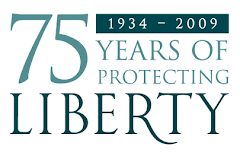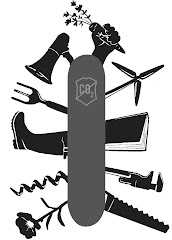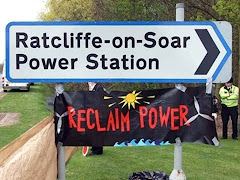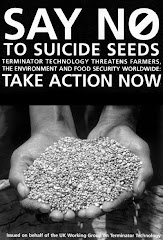I went to protest against the meeting of the G20 in London last week. I listened to a samba band, chatted to lots of lovely random people, ate slightly squashed sandwiches in the sunshine and was nowhere near where Ian Tomlinson died.
To briefly fill you in if you’ve been on another planet for the last week or so; someone who had nothing to do with the protests was walking home through it all, and was hit and pushed over by a police officer in riot gear. Video of this happening was recorded on at least two different cameras by other people nearby - which you can see here and here - and we’ll probably eventually see footage from CCTV cameras in the area too. It is pretty clear that it’s assault. He died in the street soon afterwards of a heart attack, and it seems that police officers actively hindered the efforts of a medical student to give him first aid, and then delayed an ambulance attending the scene to resuscitate him.
Plenty has already been written about the G20, the protests against it, the police tactics used and the press coverage of it all.
The one thing I don't think is being said enough at the moment is that the tactics and behaviour of the police last week were entirely routine. Just about every major protest I've ever been on, as well as many smaller ones, has been policed in more or less this way – in fact you can always spot a first-time attendee at any protest because they are the only people still expressing astonishment at what they see police officers do.
Kettling, crap (i.e. obviously arbitrary) arrests, police provoking violence, hitting people on the ground with batons, shoving very hard with shields and intimidating people who aren’t even involved happens at almost every protest. Lots of us simply expect it now. Most people who are attacked by police officers never bring a complaint - it’s not usually possible to identify individual officers after the event, and onlookers are often busy being attacked themselves rather than filming what is happening. But it happens all the time.
I’ve seen countless protesters with head injuries, because lines of police often raise their batons above their own heads to beat indiscriminately down on crowds of people, after pushing them back so they’re packed too close together to be able to avoid the blows.
Every time there is any liaison between protesters and police, we ask them to ensure that all officers’ identification numbers are kept clearly visible precisely so that we can hold them accountable for this behaviour. Every time they fail to do this.
They actively prevent people from recording their actions by filming or taking photos. Even people who realise that media coverage is biased often have little idea how profound and widespread the bias is. Unprovoked and disproportionate police violence is massively under-recorded and under-reported, preventing any individual case from being seen in its wider context of routine police brutality.
If Ian Tomlinson had not died last week there would have been no investigation. If there had been no footage of the assault then it would have been assumed that the police had acted reasonably, and the attack would have become one of thousands of police assaults which go completely ignored every year. It’s a matter of time before someone else dies, and a matter of luck whether anyone will manage to get clear footage of it next time.
I hope the investigation into Tomlinson’s death doesn't allow everyone to narrow the focus of discussion to just this one fatal incident. It's high time that the whole nature of the role of policing at protests is called into question and that some real accountability is forced on the police.
Subscribe to:
Post Comments (Atom)

















6 comments:
And then there was JeanCharles de Menezes.
And Blair Peach.
Actually, Blair Peach was killed 30 years ago when there was much less footage of anything, but isn't it funny how you can't walk anywhere on the London Underground without being able to see several CCTV cameras at the same time - including inside carriages - but there were apparently no pictures captured at all of what happened to De Menezes?
Hi, delurking some more to add my two penn'orth. I think that this kind of behaviour is only to be expected because it has been a management decision. I have been appalled at the coverage of G20 in the lead up to the day itself. All of the papers and other news were filled with stories of how much trouble there was going to be, and how they were expecting terrorists etc. If you brief for this, through the press, and at police briefings, of course you are going to get trouble (although even the Met has agreed that it was much less than they had geared up for). It is the police management's equivalent of standing at one end of a football stadium yelling 'come and have a go if you think you're hard enough'
What i hope for the enquiry (but am not too optimistic we will get) is that these kind of issues are raised as well. Without a change from the top, we will always have to put ourselves at unneccesary risk of harm because the police are wound up too tight by being told we are all rabid and out for a fight, and then the management do not show them that they will be held accountable for their behavoiur by covering it up afterwards.
Right-o, Alice, you're great.
Alice, if you're getting the cover on that tunnel any time in the next month then I have a proposal and a few seeds for you, so drop me a line - the address is in the article you responded to over at HWzD.
Sadly, I chatted to my 16-year-old son in advance of the G20 protests, and predicted that police would be covering up their ID; that some would try to find a straggler to vent their frustration on; and that although CCTV might prove mysteriously patchy there would be some amateur footage. This morning I added 'and if you think THIS is a fuss, wait and see what happens when it's a policeman who gets killed'.
It's human nature. Talk two groups of tribal apes and stick one group in uniforms, then watch what happens...
Post a Comment